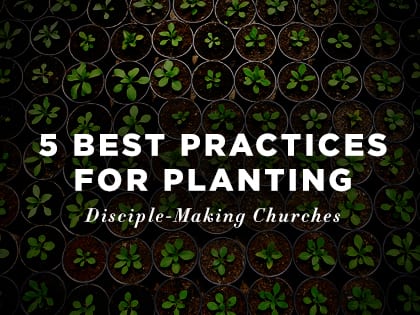In those groups, leaders encouraged outside Bible reading and each time the group met, they focused on two questions:
1. What is the Holy Spirit telling you?
2. What are you doing about what the Holy Spirit is telling you?
That’s it. Boom! These groups began to multiply throughout the United Kingdom.
A few months ago, I asked Ralph Moore to make a presentation on how disciple making works in the Hope Chapel movement. He and Alex Absalom understand the importance and impact of simplicity:
“We invite people into relationships,” Moore explains. “Then we invite them to our church gathering on Sunday where we preach one chapter from the Bible each week.” From there, people are encouraged to get into a weekly small group that asks three questions:
1. What did the Holy Spirit tell you during the teaching Sunday,
2. What are you doing about it?
3. How can we help you by our prayers and support?
Hope Chapel small group leaders meet regularly with pastoral staff to work through leadership books and Scripture. In these leadership huddles, they ask the same three questions, applying those questions to their leadership readings.
That’s it. Simple. The heart of the Hope Chapel Movement.
4. They provide practical tools.
Not all disciple-making leaders make it as stunningly simple as Absalom and Moore. But they do understand that equipping everyday Christians with practical disciple-making tools is key to multiplication.
Randy Pope is the founding pastor of Perimeter Church in Atlanta, Georgia, part of the Presbyterian Church of America. Theology, Bible study and doctrine are extremely important to the Atlanta church. So is church planting. Perimeter has planted 40 churches. Like all disciple-making churches, the church has a high number of people in discipling relationships outside of Sunday mornings. Perimeter leaders have cracked the code on making deeper theology both practical and learnable. They call their model Life on Life Missional Discipleship.
“Too many pastors talk about disciple making but fail their people because they do not give them practical, easily usable tools,” Pope says, adding that tools are essential because they transform disciple making from an abstract concept or theory into natural, simple practices anyone can follow.
5. They make “equipping Christians for ministry” the top responsibility of leadership staff.
Don’t miss this last practice. It is the foundation that supports the four practices above. These national leaders agree that two roles are essential to creating a disciple-making, multiplying church: 1) Pastoral leaders who function as equippers and 2) Church members who function as ministers of the church.
Not only are disciple-making leaders committed to Jesus’ method, they also are committed to being equippers of everyday Christians. The primary job of church leaders is to equip, train and coach members to do the ministry of being disciples who make disciples.
Moreover, everyday church members must embrace their role. As the apostle Paul and Peter stress in their letters to the church, the people are the ministers, serving God in their unique gifts and ministries (Romans 12:38, 1 Peter 4:10-11).
When both roles are working together, a culture of multiplication begins to grow in which disciple-making leaders develop disciple makers who naturally develop disciples, who then grow to become disciple makers.
From these five best practices, we can develop a list of practical action points:
1. Become a leader who makes disciple making the top priority.
2. Focus on mobilizing everyday people.
3. Keep disciple making simple and reproducible.
4. Provide practical tools that make disciple making doable.
5. Ask all staff to focus on equipping members to be disciple-making ministers.
Planting a church of disciples who make disciples isn’t only doable; it is what Jesus commanded his church to do. When we make the multiplication of disciples our top priority, we lead and empower our present and future churches to find their place in Jesus’ mission and his ultimate plan for redeeming his people.
As founder of Discipleship.org, Bobby Harrington is bent on seeing churches become disciple makers. Join him and other disciple-making leaders at Exponential West in Los Angeles (Oct. 3-6) and at the National Disciple Making Forum in Nashville, Tennessee (Oct. 6-7). For more information, go to Exponential.org/events and Discipleship.org.

